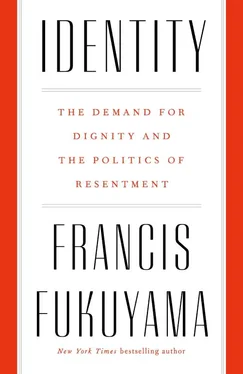And in many other places, don’t we… notice that, when desire forces someone contrary to the calculating part, he reproaches himself and his spirit is roused against that in him which is doing the forcing; and, just as though there were two parties at faction, such a man’s spirit becomes the ally of speech? {4} 4 Ibid., 440a–b.
We could transpose this into a more contemporary example, where a drug addict or alcoholic knows that another hit or drink is bad for him or her, but nonetheless takes it and feels a deep self-loathing for being weak. Socrates uses a new word, spirit , to refer to the part of the soul that is the seat of this anger against oneself, which is a poor translation of the Greek word thymos .
Socrates then asks Adeimantus whether the part of the soul that wanted not to look at the corpses was just another desire or was an aspect of the calculating part, since they both pushed in the same direction. The former view would be the perspective of contemporary economics, where one desire is limited only by the calculation that another, more important desire supersedes it. Socrates asks, is there a third part of the soul?
What we are now bringing to light about the spirited is the opposite of our recent assertion. Then we supposed it had something to do with the desiring part; but now, far from it, we say that in the faction of the soul it sets its arms on the side of the calculating part.
Quite so, [Adeimantus] said.
Is it then different from the calculating part as well, or is it a particular form of it so that there aren’t three forms in the soul but two, the calculating part and the desiring? Or just as there were three classes in the city that held it together, money-making, auxiliary, and deliberative, is there in the soul too this third, the spirited, by nature an auxiliary to the calculating part, if not corrupted by bad rearing? {5} 5 Ibid., 440e–441a.
Adeimantus immediately agrees with Socrates that the spirited part—thymos—is neither just another desire nor an aspect of reason but an independent part of the soul. Thymos is the seat of both anger and pride: Leontius was proud and believed he had a better self that would resist looking at the corpses, and when he gave in to his desires, he became angry at his failure to live up to that standard.
More than two millennia before its advent, Socrates and Adeimantus understood something unrecognized by modern economics. Desire and reason are component parts of the human psyche (soul), but a third part, thymos, acts completely independently of the first two. Thymos is the seat of judgments of worth: Leontius believed he was above staring at corpses, just as a drug addict wants to be a productive employee or a loving mother. Human beings do not just want things that are external to themselves, such as food, drink, Lamborghinis, or that next hit. They also crave positive judgments about their worth or dignity. Those judgments can come from within, as in Leontius’ case, but they are most often made by other people in the society around them who recognize their worth. If they receive that positive judgment, they feel pride, and if they do not receive it, they feel either anger (when they think they are being undervalued) or shame (when they realize that they have not lived up to other people’s standards).
This third part of the soul, thymos, is the seat of today’s identity politics. Political actors do struggle over economic issues: whether taxes should be lower or higher, or how the pie of government revenue will be divided among different claimants in a democracy. But a lot of political life is only weakly related to economic resources.
Take, for example, the gay marriage movement, which has spread like wildfire across the developed world in the first decades of the twenty-first century. This does have an economic aspect, having to do with rights of survivorship, inheritance, and the like for gay or lesbian unions. However, many of those economic issues could have been and were in many cases resolved through new rules about property in civil unions. But a civil union would have had lower status than a marriage: society would be saying that gay people could be together legally, but their bond would be different from that between a man and a woman. This outcome was unacceptable to millions of people who wanted their political systems to explicitly recognize the equal dignity of gays and lesbians; the ability to marry was just a marker of that equal dignity. And those opposed wanted something of the opposite: a clear affirmation of the superior dignity of a heterosexual union and therefore of the traditional family. The emotions expended over gay marriage had much more to do with assertions about dignity than they did with economics.
Similarly, the massive anger of women embodied in the #MeToo movement that emerged in the wake of revelations about the behavior of Hollywood producer Harvey Weinstein was fundamentally about respect. While the way in which powerful men had coerced vulnerable women had an economic dimension, the wrong of valuing a woman for her sexuality or looks alone and not for other characteristics such as competence or character would exist among men and women of equal wealth or power.
But we are getting ahead of ourselves in the story of thymos and identity. Socrates in the Republic does not argue that thymos is a characteristic shared equally among all human beings, nor does he suggest that it makes itself manifest in a variety of forms. It appears as something associated with a particular class of human beings in his imaginary city, the guardians or auxiliaries who would be responsible for defending the city from its enemies. They are warriors, different from shopkeepers, for whom desires and their satisfaction are the chief characteristic, as well as from the deliberative class of leaders, who use their reason to determine what is best for the city. Socrates suggests that the thymotic guardians are typically angry and compares them to dogs who are vicious toward strangers and loyal to their masters. As warriors they must be courageous; they must be willing to risk their lives and undergo hardship in a way that neither the merchant class nor the deliberative class would. Anger and pride rather than reason or desire motivates them to take the risks they do.
In speaking this way, Socrates reflects the reality of the classical world, indeed, the reality of most civilizations around the world that possessed an aristocratic class whose claim to high social status lay in the fact that they, or their ancestors, were warriors. The Greek word for “gentleman” was kaloskagathos , or “beautiful and good,” while the very word aristocracy derives from the Greek term “rule by the best.” These warriors were seen as morally different from shopkeepers because of their virtue: they were willing to risk their lives for the public good. Honor accrued only to people who deliberately rejected rational utility maximization—our modern economic model—in favor of those who were willing to risk the most important utility of all, their lives.
Today, we tend to look back on aristocrats with a great deal of cynicism, regarding them at best as self-important parasites, and at worst as violent predators on the rest of their society. Their descendants are even worse, since they did not themselves earn the status that their families receive, but got it as an accident of birth. We have to recognize, however, that in aristocratic societies there was a deeply rooted belief that honor or esteem was not due to everyone, but only to the class of people who risked their lives. An echo of that feeling still exists in the respect we citizens of modern democratic societies typically pay to soldiers who die for their country, or policemen and firemen who risk their lives in the line of duty. Dignity or esteem is not due to everyone, least of all to businesspeople or workers whose main objective is to maximize their own welfare. Aristocrats thought of themselves as better than other people and possessed what we may call megalothymia, the desire to be recognized as superior. Predemocratic societies rested on a foundation of social hierarchy, so this belief in the inherent superiority of a certain class of people was fundamental to the maintenance of social order.
Читать дальше












